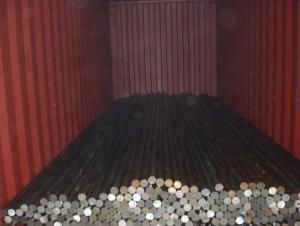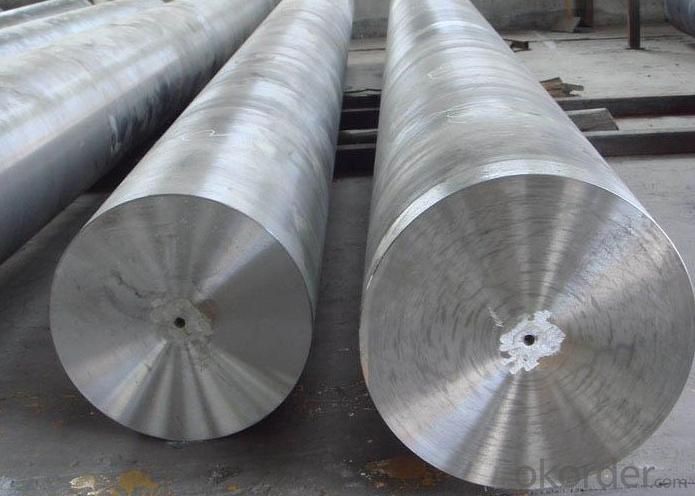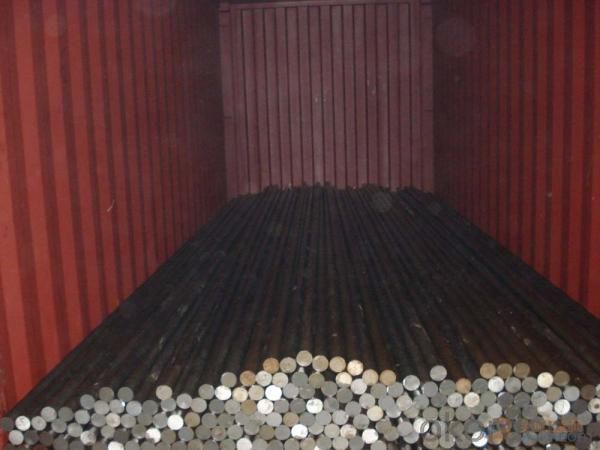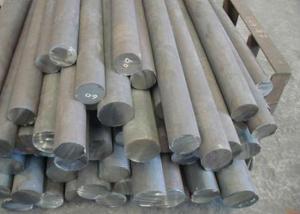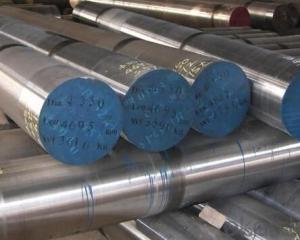Japanese Standard Bearing Steel
- Loading Port:
- Guangzhou
- Payment Terms:
- TT or LC
- Min Order Qty:
- 25MT m.t.
- Supply Capability:
- 600000 Tons/Year m.t./month
OKorder Service Pledge
OKorder Financial Service
You Might Also Like
Specifications of Japanese Standard Bearing Steel
|
Material |
SUJ2 | ||
|
Chemical Composition |
Mechanical Properties(In Quenched & Tempered State) | ||
|
C |
0.95-1.05 |
Hardness |
HRC≈67 |
|
Si |
0.15-0.35 |
HRC61-66 | |
|
Mn |
0.25-0.45 |
HRC62-66 | |
|
Cr |
1.40-1.65 |
-- | |
|
Mo |
≤0.10 |
-- | |
|
P |
≤0.025 |
HB170-207 | |
|
S |
≤0.025 |
HB207-229 | |
|
Cu |
≤0.25 |
HB270-390 | |
|
Ni+Cu |
≤0.50 |
HB229-285 | |
Dimension: Thickness: 20mm-1000mm, Length: 500mm-6000mm
Technique: Hot rolled, cold drawn, forged
Surface treatment: Black, grinding, bright, polish
Type: Alloy Steel Bar
Documents required: Commercial invoice; Packing list; Bill of lading; Certificate of origin and others that the target market needs.
Usage and Applications of Japanese Standard Bearing Steel
High Quality Bearing steel is used for manufacturing ball, roller bearing steel and rings. Bearing in work is under great pressure and friction, so have high demands bearing steel and hardness and resistance, and high elastic limit.
Bearing steels are used for ball and roller bearing applications and are comprised of low carbon steels and high carbon through harden able steel.
For example, bearing ring, steel rolling mill, machinery, 100Cr6 bearing steel ball is widely used in high-speed and low-noise bearing, bicycle, motorcycle, automobile, bags electronically.
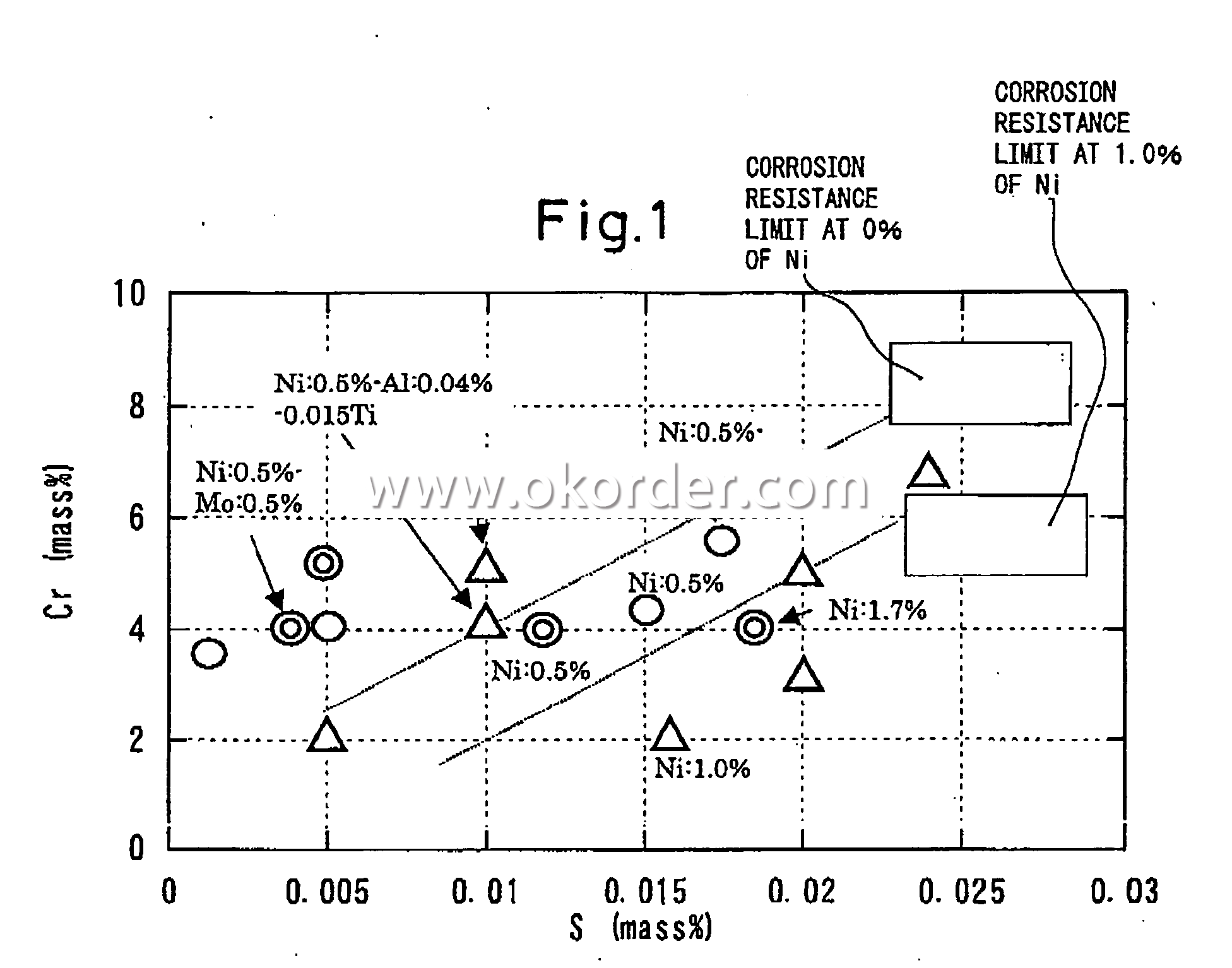
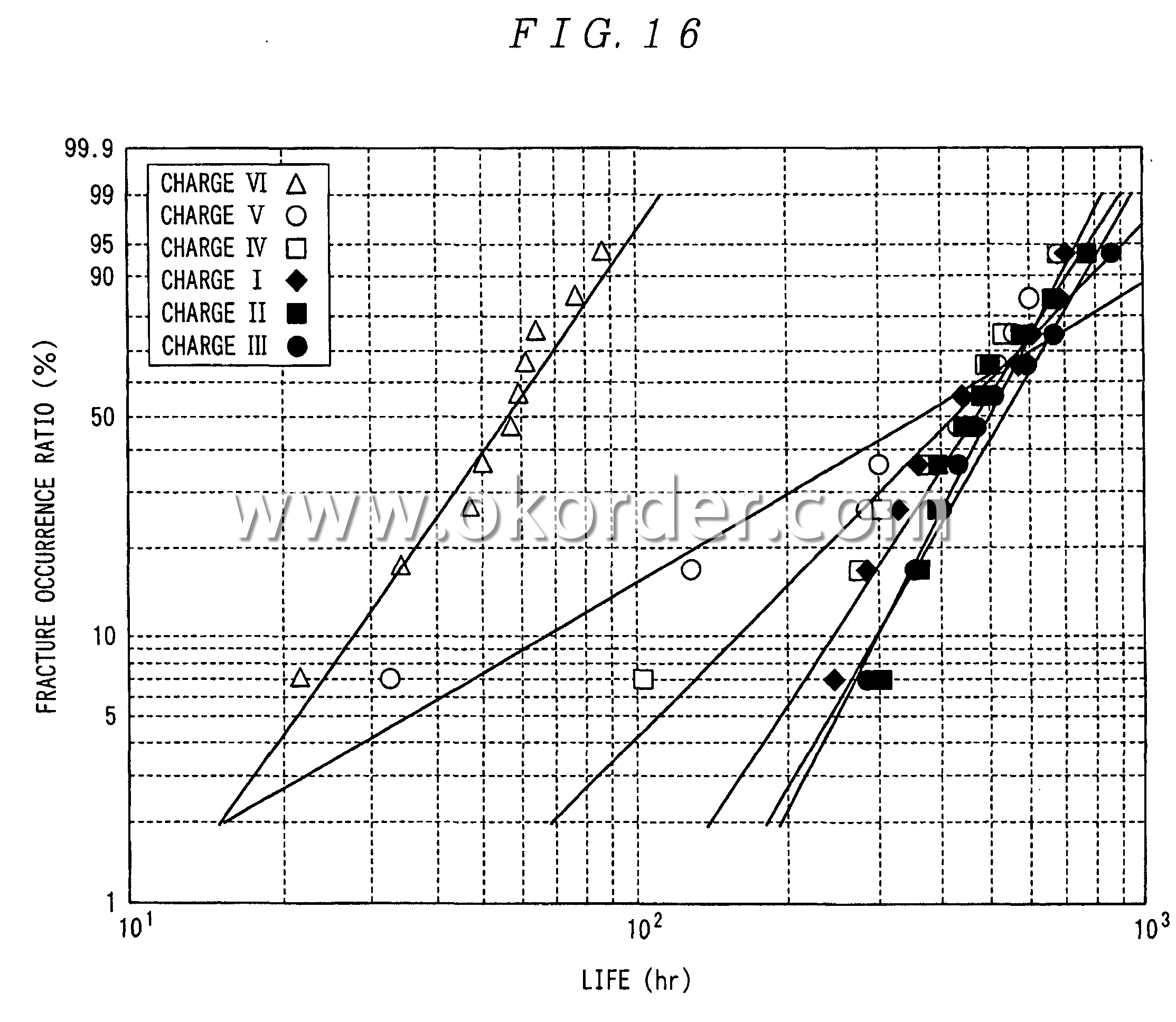
Packaging & Delivery of Japanese Standard Bearing Steel
Packaging Detail: Standard seaworthy packing or as customer required.
Delivery Detail: 45 days
Trade terms: FOB, CFR, CIF
MOQ: 25 tons or at customer's demands
Weight: Theprice invoicing on theoretical weight basis or actual weight basis depends on customer’s request.
Shipment: The shipment of bulk break or container is depends on customer’s request.
Other equivalent steel materials of Japanese Standard Bearing Steel
|
USA |
Japanese |
Germany |
British |
France |
|
ASTM&AISI&SAE |
JIS |
EN DIN |
EN BS |
EN NF |
|
52100 |
SUj2 |
100Cr6 |
100Cr6 |
100Cr6 |
|
1.2067 |
1.2067 |
1.2067 |
Characteristics of Japanese Standard Bearing Steel
1. The technical workers we employed are the ones with many years’ working experience, who know the technology procedures very well.
2. We will strictly inspect our production that we sold according to the customer’s request.
3. Our steel reaches international quality standards. Besides, our company is equipped with large-sized vertical saw machines, horizontal saw machines, milling machines, grinding machines and other advanced equipment. All our products are carried out hardness tests, such as the ultrasonic flaw detection before shipment. Therefore, there is no quality problem. With more competitive price than other suppliers, our steel has good sales in the markets of North America, South America, East Europe, Southeast Asia, Africa, Oceania, the Middle East, East Asia and West Europe.
4. We can accept L/C usance or L/C at sight.
5. Quality should be in conformity with the specification of the manufacturer. Quantity and packing conditions should be in conformity with the term in this contract.
- Q: How does special steel perform in molding applications?
- Due to its exceptional properties and performance, special steel is highly favored in molding applications. Firstly, its excellent hardness and wear resistance ensure that it remains undamaged and maintains its shape even under high pressure and temperature during the molding process. Additionally, special steel's superb thermal conductivity allows for efficient heat transfer, resulting in uniform heating and cooling of the mold. This leads to consistent and high-quality molded products and reduces cycle times, thus enhancing productivity. Furthermore, special steel's superior corrosion resistance prevents any chemical reactions or rusting, ensuring its durability and longevity even when exposed to moisture or corrosive substances. When it comes to machinability, special steel is easily workable, enabling precise and intricate mold designs. This facilitates the production of detailed molded products with high accuracy and dimensional stability. Lastly, special steel's excellent strength and toughness make it highly resistant to cracking or fracturing under high stress conditions. Consequently, this guarantees the longevity and reliability of the mold, minimizing the need for frequent repairs or replacements. Overall, the exceptional properties of special steel, including hardness, wear resistance, thermal conductivity, corrosion resistance, machinability, and strength, make it an ideal choice for molding applications. It ensures high-quality and consistent molded products, increased productivity, and extended lifespan for the molds.
- Q: What are the different methods of preventing intergranular corrosion in special steel?
- Various techniques are available for preventing intergranular corrosion in special steel. 1. Heat Treatment: A highly effective approach involves subjecting the steel to solution annealing, a heat treatment process. This method entails heating the steel to a high temperature and rapidly cooling it. By doing so, any precipitates or carbides that may have formed along the grain boundaries are dissolved, thereby reducing the risk of intergranular corrosion. 2. Alloying: Another strategy is to introduce specific alloying elements into the steel composition. For instance, the addition of elements such as chromium and molybdenum can enhance the steel's resistance to intergranular corrosion. These alloying elements create a protective oxide layer on the surface, preventing corrosion along the grain boundaries. 3. Passivation: Passivation involves treating the steel surface with chemicals that establish a protective layer. This layer acts as a barrier, safeguarding the grain boundaries from the corrosive environment. Common passivation techniques include acid pickling and electrochemical methods. 4. Sensitization Control: Particular attention must be given to controlling the sensitization process. Sensitization occurs when the steel is exposed to high temperatures for an extended period, resulting in the precipitation of chromium carbides along the grain boundaries and rendering the steel vulnerable to intergranular corrosion. By carefully controlling the heating and cooling rates during processing, sensitization can be minimized or prevented. 5. Corrosion Inhibitors: Another option is the utilization of corrosion inhibitors, which are chemicals that can be applied to the steel surface to protect it from corrosion. These inhibitors form a protective film on the surface, preventing corrosive agents from attacking the grain boundaries. It is important to consider that the choice of method depends on the specific type of special steel and its intended application. Selecting the most suitable approach requires a comprehensive understanding of the steel's composition, processing conditions, and the expected corrosive environment.
- Q: What are the environmental considerations of using special steel?
- There are several environmental considerations associated with the use of special steel. Firstly, the production of special steel involves the extraction and processing of raw materials, which can have significant environmental impacts. The mining of iron ore and other minerals required for steel production often results in habitat destruction, soil erosion, and water pollution. Additionally, the energy-intensive processes used to convert raw materials into steel emit large amounts of greenhouse gases, contributing to climate change. Furthermore, the disposal of special steel products at the end of their life cycle can also pose environmental challenges. Steel is a non-renewable resource, and its disposal in landfills can contribute to waste accumulation and resource depletion. However, steel is highly recyclable, and recycling steel products can significantly reduce the environmental impact associated with their disposal. In terms of transportation, special steel is often heavy and bulky, which leads to higher fuel consumption during transportation. This can contribute to air pollution and carbon emissions, particularly if long-distance shipping is involved. Moreover, the manufacturing processes used to produce special steel can generate various types of waste, such as slag and dust, which need to be properly managed to prevent negative environmental impacts. The treatment and disposal of these waste materials require careful consideration to ensure they do not contaminate soil, water, or air. To mitigate these environmental considerations, companies in the steel industry have been adopting more sustainable practices. This includes investing in cleaner technologies, such as electric arc furnaces that use recycled steel as feedstock, to reduce energy consumption and emissions. Additionally, implementing efficient waste management systems and promoting steel recycling can help minimize waste generation and resource depletion. Overall, while the use of special steel has undeniable benefits in various industries, it is crucial to consider and address the associated environmental impacts. Adopting sustainable practices throughout the entire lifecycle of special steel, from raw material extraction to end-of-life disposal, is vital in minimizing its environmental footprint and promoting a more sustainable future.
- Q: How does special steel contribute to the oil and gas industry?
- Special steel plays a crucial role in the oil and gas industry by offering enhanced strength, durability, and corrosion resistance needed for various applications. It is used in the construction of pipelines, drilling equipment, storage tanks, and offshore platforms, ensuring reliable and safe operations in harsh environments. Additionally, special steel's high heat resistance enables it to withstand extreme temperatures in refining processes, while its resistance to cracking and wear ensures the longevity of critical components. Overall, special steel contributes significantly to the oil and gas industry by providing the necessary materials for efficient and secure exploration, production, and transportation of oil and gas resources.
- Q: Can special steel be used in the power generation equipment manufacturing industry?
- Yes, special steel can be used in the power generation equipment manufacturing industry. Special steel, also known as alloy steel, offers enhanced properties such as high strength, corrosion resistance, and heat resistance. These qualities make it suitable for various components in power generation equipment, including turbines, boilers, and generators, which often operate under extreme conditions. By using special steel, manufacturers can ensure the durability, efficiency, and reliability of the equipment, thus meeting the demanding requirements of the power generation industry.
- Q: How is corrosion-resistant alloy steel used in the production of chemical processing equipment?
- Corrosion-resistant alloy steel is widely used in the production of chemical processing equipment due to its ability to withstand harsh chemical environments. It is used to construct various components such as pipes, tanks, valves, and heat exchangers, providing excellent resistance to corrosion and chemical attack. This ensures the integrity and longevity of the equipment, preventing leaks, contamination, and potential hazards. Additionally, corrosion-resistant alloy steel offers high strength and durability, making it suitable for handling aggressive chemicals and maintaining operational efficiency in chemical processing plants.
- Q: How does special steel ensure dimensional stability?
- Special steel ensures dimensional stability through various mechanisms. Firstly, special steel is known for its high strength and toughness, which allows it to withstand external forces and prevent deformation. This is particularly important in applications where dimensional accuracy is crucial, such as in precision machinery or tooling. Additionally, special steel undergoes specific heat treatment processes to enhance its dimensional stability. For instance, quenching and tempering treatments are commonly applied to increase the steel's hardness and resistance to wear, while minimizing the risk of warping or distortion. These treatments also help to maintain the steel's shape and size over time, even under fluctuating temperature conditions. Moreover, special steel often contains alloying elements such as chromium, nickel, or molybdenum, which contribute to its corrosion resistance. By preventing oxidation and rusting, these alloying elements help to preserve the steel's dimensional stability by preventing any deterioration or loss of material due to corrosion. Furthermore, the manufacturing process of special steel involves strict quality control measures to ensure consistent dimensional accuracy. This includes precise control of the composition, refining techniques, and casting or forging processes. By maintaining tight tolerances during production, special steel can achieve the desired dimensional stability required for specific applications. In summary, special steel ensures dimensional stability through its high strength, heat treatment processes, alloying elements for corrosion resistance, and strict quality control during manufacturing. These factors collectively contribute to maintaining the steel's shape, size, and accuracy over time.
- Q: How does special steel contribute to reducing product failures in high-stress applications?
- Special steel contributes to reducing product failures in high-stress applications by providing enhanced mechanical properties and improved resistance to wear, corrosion, and fatigue. Its superior strength, toughness, and durability enable it to withstand extreme conditions and loads, ensuring the longevity and reliability of the products. Additionally, special steel allows for precise engineering and manufacturing, resulting in components that can withstand high stress without deformation or failure.
- Q: Can special steel be used for jewelry?
- Yes, special steel can be used for jewelry. Special steel, such as stainless steel or titanium, is often used in jewelry making due to its durability, resistance to tarnish, and hypoallergenic properties. It is commonly used for crafting earrings, necklaces, bracelets, and rings, providing a sleek and contemporary look for those who prefer an alternative to traditional precious metals.
- Q: How is special steel used in the medical manufacturing process?
- Special steel is used in the medical manufacturing process for various applications such as surgical instruments, implants, and medical devices. Its unique properties, including corrosion resistance, strength, and biocompatibility, make it ideal for ensuring the quality, durability, and safety of medical equipment.
1. Manufacturer Overview
| Location | Guangdong, China |
| Year Established | 2005 |
| Annual Output Value | Above US$ 100 Million |
| Main Markets | korea, India, Malaysia, Brazil, Germany, Belgium, Middle East |
| Company Certifications |
2. Manufacturer Certificates
| a) Certification Name | |
| Range | |
| Reference | |
| Validity Period |
3. Manufacturer Capability
| a) Trade Capacity | |
| Nearest Port | Guangzhou |
| Export Percentage | 50%-80% |
| No.of Employees in Trade Department | 21-100 People |
| Language Spoken: | English; Chinese |
| b) Factory Information | |
| Factory Size: | 23,000 square meters |
| No. of Production Lines | 1 |
| Contract Manufacturing | OEM servise offered |
| Product Price Range | high; average |
Send your message to us
Japanese Standard Bearing Steel
- Loading Port:
- Guangzhou
- Payment Terms:
- TT or LC
- Min Order Qty:
- 25MT m.t.
- Supply Capability:
- 600000 Tons/Year m.t./month
OKorder Service Pledge
OKorder Financial Service
Similar products
Hot products
Hot Searches
Related keywords

